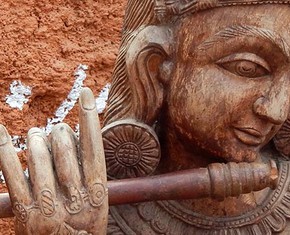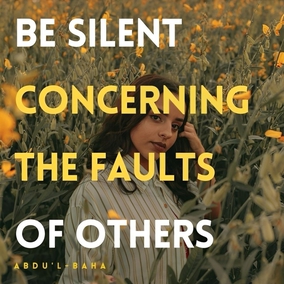The views expressed in our content reflect individual perspectives and do not represent the authoritative views of the Baha'i Faith.
If you already believe in one prophet—Buddha, Moses, Christ, Muhammad—can you believe in others?
The Baha’i teachings answer that question with an emphatic and enthusiastic Yes! In just one example of this primary Baha’i principle, Abdu’l-Baha gave a powerful and controversial 1912 address challenging the Jewish members of Washington, D.C.’s largest synagogue, the Eighth Street Temple, to recognize and acknowledge Jesus Christ. He started his famous address this way:
God is one, the effulgence of God is one, and humanity constitutes the servants of that one God. God is kind to all. He creates and provides for all, and all are under His care and protection. The Sun of Truth, the Word of God, shines upon all mankind; the divine cloud pours down its precious rain; the gentle zephyrs of His mercy blow, and all humanity is submerged in the ocean of His eternal justice and loving-kindness. God has created mankind from the same progeny in order that they may associate in good fellowship, exercise love toward each other and live together in unity and brotherhood.
But we have acted contrary to the will and good pleasure of God. We have been the cause of enmity and disunion. We have separated from each other and risen against each other in opposition and strife. How many have been the wars between peoples and nations! What bloodshed! Numberless are the cities and homes which have been laid waste. All of this has been contrary to the good pleasure of God, for He hath willed love for humanity. – Abdu’l-Baha, The Promulgation of Universal Peace, pp. 402-403.
Abdu’l-Baha told the congregation much of that bloodshed and war was waged over religion:
Most regrettable of all is the state of difference and divergence we have created between each other in the name of religion, imagining that a paramount duty in our religious belief is that of alienation and estrangement, that we should shun each other and consider each other contaminated with error and infidelity. In reality, the foundations of the divine religions are one and the same. The differences which have arisen between us are due to blind imitations of dogmatic beliefs and adherence to ancestral forms of worship. – ibid, p. 403.
Abdu’l-Baha then praised all the prophets for proclaiming teachings of justice, mercy and love:
Even as God is pronounced to be just, man must likewise be just. As God is loving and kind to all men, man must likewise manifest loving-kindness to all humanity. As God is loyal and truthful, man must show forth the same attributes in the human world. Even as God exercises mercy toward all, man must prove himself to be the manifestation of mercy. In a word, the image and likeness of God constitute the virtues of God, and man is intended to become the recipient of the effulgences of divine attributes. This is the essential foundation of all the divine religions, the reality itself, common to all. Abraham promulgated this; Moses proclaimed it. Christ and all the Prophets upheld this standard and aspect of divine religion. – ibid, p. 403.
Then, to the delight of the Jewish congregation, Abdu’l-Baha effusively praised the teachings of Moses:
Inasmuch as Moses through the influence of His great mission was instrumental in releasing the Israelites from a low state of debasement and humiliation, establishing them in a station of prestige and glorification, disciplining and educating them, it is necessary for us to reach a fair and just judgment in regard to such a marvelous Teacher. For in this great accomplishment He stood single and alone. Could He have made such a change and brought about such a condition among these people without the sanction and assistance of a heavenly power? Could He have transformed a people from humiliation to glory without a holy and divine support?
None other than a divine power could have done this. Therein lies the proof of Prophethood because the mission of a Prophet is education of the human race such as this Personage accomplished, proving Him to be a mighty Prophet among the Prophets and His Book the very Book of God. This is a rational, direct and perfect proof. – ibid, p. 406.
Abdu’l-Baha took the audience through a short history of the Jewish people and their struggles, and then said “I now wish you to examine certain facts and statements which are worthy of consideration:”
During the time that the people of Israel were being tossed and afflicted by the conditions I have named, Jesus Christ appeared among them. Jesus of Nazareth was a Jew. He was single and unaided, alone and unique. He had no assistant. The Jews at once pronounced Him to be an enemy of Moses. They declared that He was the destroyer of the Mosaic laws and ordinances. Let us examine the facts as they are, investigate the truth and reality in order to arrive at a true opinion and conclusion. For a completely fair opinion upon this question we must lay aside all we have and investigate independently. This Personage, Jesus Christ, declared Moses to have been the Prophet of God and pronounced all the prophets of Israel as sent from God. He proclaimed the Torah the very Book of God, summoned all to conform to its precepts and follow its teachings… It is evident, then, that Christ was a friend of Moses, that He loved and believed in Moses; otherwise, He would not have commemorated His name and Prophethood. This is self-evident. Therefore, Christians and Jews should have the greatest love for each other because the Founders of these two great religions have been in perfect agreement in Book and teaching. Their followers should be likewise. – ibid, pp. 407-408.
Finally, Abdu’l-Baha asked his Jewish listeners to accept Christ and the subsequent prophets, as well. This caused quite a stir in the synagogue:
Today all Christians admit and believe that Moses was a Prophet of God. They declare that His Book was the Book of God, that the prophets of Israel were true and valid and that the people of Israel constituted the people of God. What harm has come from this? What harm could come from a statement by the Jews that Jesus was also a Manifestation of the Word of God? Have the Christians suffered for their belief in Moses? Have they experienced any loss of religious enthusiasm or witnessed any defeat in their religious belief by declaring that Moses was a Prophet of God, that the Torah was a Book of God and that all the prophets of Israel were prophets of God? It is evident that no loss comes from this. And now it is time for the Jews to declare that Christ was the Word of God, and then this enmity between two great religions will pass away. For two thousand years this enmity and religious prejudice have continued. Blood has been shed, ordeals have been suffered. These few words will remedy the difficulty and unite two great religions. What harm could follow this: that just as the Christians glorify and praise the name of Moses, likewise the Jews should commemorate the name of Christ, declare Him to be the Word of God and consider Him as one of the chosen Messengers of God? – ibid, p. 408.
















Comments
Sign in or create an account
Continue with Googleor